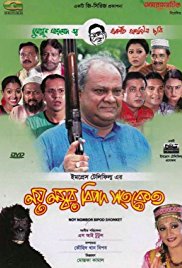Ranjana can stand for:
- Ranjana script, an abugida writing system derived from Brāhmī in the 11th century
- Ranjana Deshmukh, Indian actress who worked in Marathi cinema in the 70s and 80s
Ranjana can stand for:

Udit Narayan Jha is an Indian playback singer whose songs have been featured mainly in Hindi films. He has also sung in various other languages including Telugu, Kannada, Tamil, Bengali, Odia, Bhojpuri, Nepali, Malayalam, Assamese, Bagheli and Maithili. He has won four National Film Awards and five Filmfare Awards with twenty nominations among many others. The Government of India honoured him with the Padma Shri in 2009 and the Padma Bhushan in 2016 for his contribution towards arts and culture. As many as 21 of his tracks feature in BBC's "Top 40 Bollywood Soundtracks of all time".
The Rañjanā script (Lantsa) is an abugida writing system which developed in the 11th century and until the mid-20th century was used in an area from Nepal to Tibet by the Newar people, the historic inhabitants of the Kathmandu Valley, to write Sanskrit and Newar. Nowadays it is also used in Buddhist monasteries in India; China, especially in the Tibetan Buddhist areas within the Tibet Autonomous Region, Sichuan, Yunnan, Qinghai and Gansu; Mongolia, and Japan. It is normally written from left to right but the Kutakshar form is written from top to bottom. It is also considered to be the standard Nepali calligraphic script.

Anjan Dutta is an Indian film director, actor, and singer-songwriter known for his work in the Bengali alternative music genre anyodharar gaan . As an actor, Dutta began his career in Bengali cinema in the Mrinal Sen film Chalachitro, for which he won the best newcomer actor award at the Venice Film Festival. He acted in Aparna Sen's hit film, Mr. and Mrs. Iyer. In 2018 he featured in Swapnasandhani's new play Taraye Taraye, as Vincent van Gogh, under the direction of Kaushik Sen.

Satyakam is a 1969 Indian drama film directed by Hrishikesh Mukherjee, based on a Bengali novel of the same name by Narayan Sanyal. The film stars Dharmendra, Sharmila Tagore, Sanjeev Kumar, and Ashok Kumar. The film was scored by Laxmikant Pyarelal. The name of the film is taken from ancient Hindu saint Satyakama Jabala.

Nepalese scripts are a family of alphabetic writing systems employed historically in Nepal Mandala by the indigenous Newars for primarily writing Nepal Bhasa. It is also used for transcribing Sanskrit and Pali. There are also some claims they have also been used to write the Parbatiya (Khas) language.

Outcast of the Islands is a 1951 British adventure drama film directed by Carol Reed based on Joseph Conrad's 1896 novel An Outcast of the Islands. The film features Trevor Howard, Ralph Richardson, Robert Morley and Wendy Hiller.
Gohar and Gauhar are given names and surnames. Gawhar is a given name. Bearers of the name include:
Ranjana Deshmukh was an Indian actress known for her work in several popular Marathi films productions in 1970s & '80s. She has won Filmfare Marathi for Best Actress twice, first for her film "Sushila" (1979) and then for her film "Savitri" (1983).

Prachalit is a type of abugida script developed from the Nepalese scripts, which are a part of the family of Brahmic scripts descended from Brahmi script. It is used to write Nepal Bhasa, Sanskrit and Pali. Various publications are still published in this script including the Sikkim Herald the bulletin of the Sikkim government.
Ranjha may refer to:
Ranjana Khanna is a literary critic and theorist recognized for her interdisciplinary, feminist and internationalist contributions to the fields of post-colonial studies, feminist theory, literature and political philosophy. She is best known for her work on melancholia and psychoanalysis, but has also published extensively on questions of post-colonial agency, film, Algeria, area studies, autobiography, Marxism, the visual and feminist theory. She received her Ph.D in 1993 from the University of York. She has taught at the University of Washington in Seattle and at the University of Utah, and in 2000 began teaching at Duke University, where she is Professor of English, Literature and Women's Studies. Her theorization of subjectivity and sovereignty, including her recent work on disposability, indignity and asylum, engages with the work of diverse thinkers such as Derrida, Irigaray, Kant, Marx, Heidegger, de Beauvoir, and Spivak. From 2007 until 2015, she was the Margaret Taylor Smith Director of Women's Studies, and in July 2017, she was appointed to be the incoming Director of the John Hope Franklin Humanities Institute, both at Duke University.
Darshana Jhaveri, the youngest of the four Jhaveri sisters, is a leading Indian exponent of Manipuri dance, an Indian classical dance form. She is a disciple of Guru Bipin Singh, and started performing on stage in 1958 along with her sisters. She is one of the founders of the Manipuri Nartanalaya in 1972, which popularized Manipuri dance in India, and is currently headed by her, with centres at Mumbai, Kolkata and Imphal.

Ranjana Ami Ar Ashbona is a 2011 Bengali language Indian rock musical drama film directed by Anjan Dutt. It won three national film awards in 2011 including best music direction and best feature film in Bengali.
Ranjan is a male given name name from Sanskrit. It may refer to:

Welcome Back is a 2015 Indian Hindi-language action crime comedy film directed by Anees Bazmee and produced by Firoz A. Nadiadwala. A sequel to the 2007 film Welcome, it features an ensemble cast that includes Anil Kapoor, Nana Patekar, John Abraham, Shruti Haasan, Shiney Ahuja, Ankita Srivastava in her debut, with Dimple Kapadia, Paresh Rawal and Naseeruddin Shah. While Kapoor, Patekar, Rawal, Karnik, Irani, Josh, Dabi, Khan and Ranjeet have reprised their roles from the previous film, Abraham and Hassan are new additions to the lead cast. Made on a budget of ₹88 crore, the film was largely shot in and around Dubai, United Arab Emirates. Welcome Back was released worldwide on 4 September 2015.

Padmashree Ranjana Gauhar is an Odissi dancer.

Noy Number Bipod Sanket is a 2007 Bengali Comedy-Drama Film directed by Humayun Ahmed. The film stars Rahmat Ali, Challenger, Jayanta Chattopadhyay, Shadhin Khosru, Tania Ahmed, Rupok Talukder, Shabnam Parvin, Maznun Mizan and Diti in lead roles. The film was shot in Nuhash Polli.

Ranjana Srivastava is an oncologist, Fulbright scholar and author from Melbourne. She is a regular columnist for The Guardian newspaper, where she writes about the intersection between medicine and humanity, and a frequent essayist for the New England Journal of Medicine. She was a finalist for the Walkley Award for Excellence in Journalism in 2018.
Baghelkhand is a region and a mountain range in central India.

Ranjana Kumari is an Indian social activist, writer, and academic. She is the director of the Centre for Social Research in Delhi and chairwoman of Women Power Connect, a national organization of women's groups.